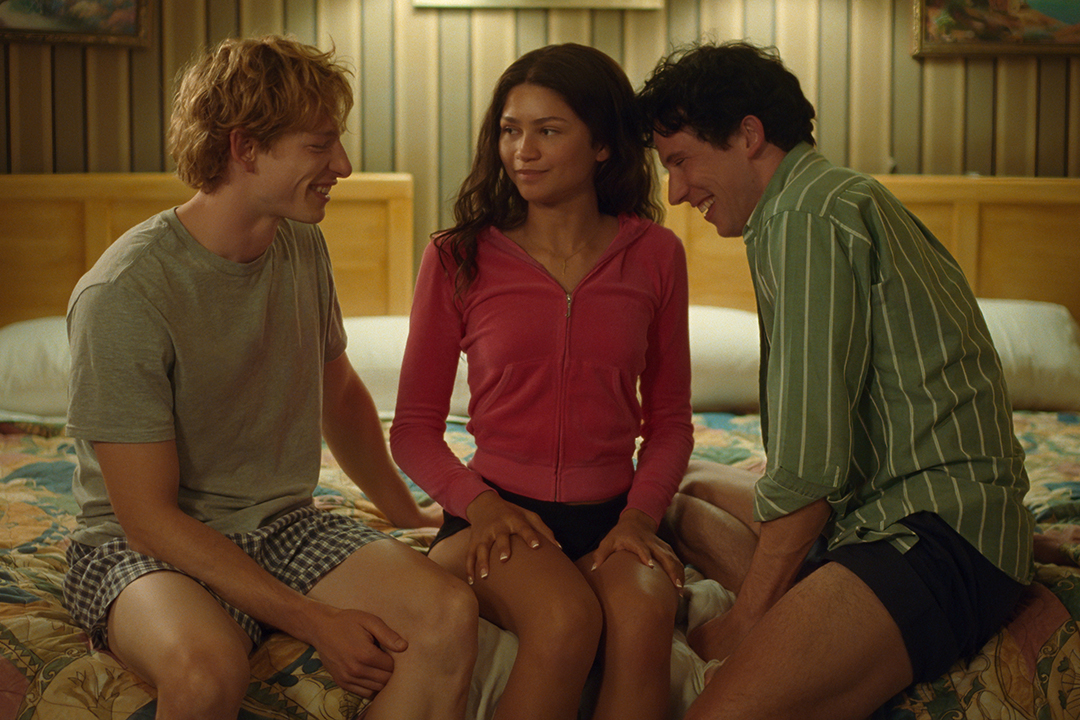This article includes spoilers for the film “Challengers” (2024).
Adrenaline pumping, nerve wracking and deliciously satisfying — six words that describe both a match point at the Wimbledon final and the viewing experience of “Challengers,” veteran director Luca Guadagnino’s latest film. Moviegoers sit tensely in their seats, eyes darting across the glowing screen like stadium-attending tennis enthusiasts following a ball. As the movie plays, they draw in breaths, freeze with anticipation and perhaps shed a tear. But most notably, and sometimes unexpectedly, they laugh.
The release of Guadagnino’s “Challengers,” which follows three extremely attractive tennis players locked in a love triangle over the course of 13 years, was highly anticipated after it was postponed last year due to the SAG-AFTRA strike; the film was originally set to debut September 2023. Even with excitement building from its star-studded cast and production, the film soars above the net, shattering expectations — specifically, my expectations of its (both intentional and unintentional) comedic prowess.
The film centers around Tashi Duncan (Zendaya), a young tennis prodigy headed for the professional leagues until a career-ending injury forces her to settle for coaching. Complicating her narrative are two ex-childhood best friends: Art (Mike Faist), her now husband and prominent-but-struggling professional player, and Patrick (Josh O’Connor), a lower-league player looking for a shot at big success. 13 years prior to the present, after the two boys met Tashi just before college, the threesome become entangled in an over-a-decade-long romantic affair, often inciting jealousy, longing and unbridled lust in all parties (which, yes, includes between the two men). The story is told largely in flashbacks, where bits and pieces of the three-way relationship dynamic culminate in a chronologically segmented tennis match between Art and Patrick, a crucial point in both their careers and their relationships with Tashi. As the story progresses, “Challengers” becomes less about tennis itself and more about power, seduction and vulnerability.
Throughout the film, the characters oscillate between being friends, lovers, strangers and rivals, roles all skillfully maneuvered by the three actors. Zendaya, in particular, stands out with her portrayal of Tashi, who evolves from a playfully conniving teen to an overly ambitious, cleverly manipulative coach who lives vicariously through her husband’s success as a professional player. Faist and O’Connor stun the audience with their effortless chemistry as childhood best friends (and likely more), later morphing into professional and romantic rivals, though still leaning into the obvious homoeroticism of the film. “Challengers” is particularly smart about its use of the gaze, whether more explicitly for comedy — Art and Patrick gawking and drooling at Tashi, mouths agape — or for heightened dramatic effect — Tashi staring daggers at Art, disappointed in his performance on the court. Guadagnino tactfully plays with the intensity associated with looking and, conversely, the vulnerability and power of being the spectacle.
In a rigid reading of the film, however, its weaknesses are revealed in its timing and cohesion, specifically regarding its score. At times, the music worked in tandem with the high-stakes, high-energy mood of a tennis match: the clubby, techno sound creeps into the scene, pulsating through the theater and accentuating the rhythm of a ball hitting a racket. However, after an uncountable number of instances where the synth-heavy beat drops abruptly at inappropriate times — many times at calmer, low-stake moments — the juxtaposition seems pointless and tired. The result is a very tonally confusing, or even volatile, sequence of scenes in the later portion of the film, especially because the rave-ready score also included carols sung by children’s choirs. Particularly toward the end, the audience is yanked out of melodrama and thrown into intense action sequences without time to recover.
I would argue that this tonal dissonance, when placed in tandem with the dramatic emotionality of certain scenes, resulted in great comedy. Don’t get me wrong—the film’s intentional comedy is masterfully handled by its screenwriter Justin Kuritzkes and the cast, whether it be stories about masturbation, witty banter or awkward silences. But there was something disorienting but also very funny about an extremely emotionally tense moment — close shots of yearning faces — suddenly being interrupted by what sounded like Swedish clubbing music. I found myself — and heard others in the theater — laughing and amused by these sharp transitions, which only added to the viewing experience.
Similarly, the creative cinematography, albeit not a weakness of the film, provided a wide array of seemingly accidental comedy, specifically by shifting the viewer’s point of view to moving objects or people. At one point, we are watching the match through Patrick’s point of view, likely filmed by strapping a GoPro camera onto O’Connor’s head. Later, as Patrick and Art each inch closer to victory in the film’s main match, we are transported to the point of view of the tennis ball, dizzyingly whacked around by the two players. Amusingly, the audience’s point of view is rapidly jerked above, below and smack dab in the middle of the action. It’s inventive, and more importantly, it’s unapologetically delightful.
My enjoyment of “Challengers” as a viewing experience came more from the amalgamation of different types of comedy than from its serious drama, which speaks volumes to the film’s successful meshing and molding of genre. At its core, “Challengers” is pure, unadulterated fun. Entertainment is back, baby!
—
Featured Image courtesy of Metro Goldwyn Mayer Pictures

